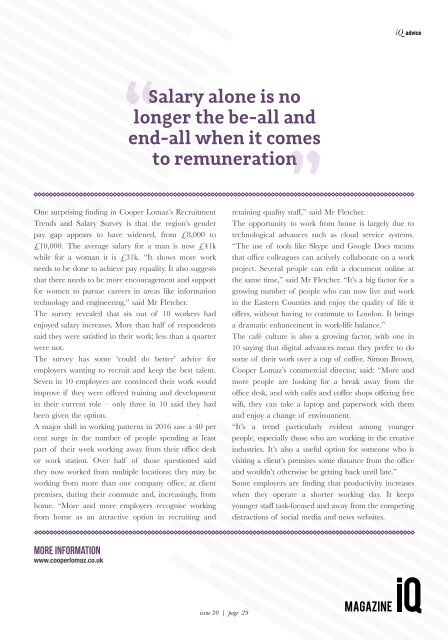IQ Magazine Issue 20
Sharing business intelligence throughout Cambridgeshire and Suffolk.
Sharing business intelligence throughout Cambridgeshire and Suffolk.
Create successful ePaper yourself
Turn your PDF publications into a flip-book with our unique Google optimized e-Paper software.
iQ advice<br />
Salary alone is no<br />
longer the be-all and<br />
end-all when it comes<br />
to remuneration<br />
One surprising finding in Cooper Lomaz’s Recruitment<br />
Trends and Salary Survey is that the region’s gender<br />
pay gap appears to have widened, from £8,000 to<br />
£10,000. The average salary for a man is now £41k<br />
while for a woman it is £31k. “It shows more work<br />
needs to be done to achieve pay equality. It also suggests<br />
that there needs to be more encouragement and support<br />
for women to pursue careers in areas like information<br />
technology and engineering,” said Mr Fletcher.<br />
The survey revealed that six out of 10 workers had<br />
enjoyed salary increases. More than half of respondents<br />
said they were satisfied in their work; less than a quarter<br />
were not.<br />
The survey has some ‘could do better’ advice for<br />
employers wanting to recruit and keep the best talent.<br />
Seven in 10 employees are convinced their work would<br />
improve if they were offered training and development<br />
in their current role – only three in 10 said they had<br />
been given the option.<br />
A major shift in working patterns in <strong>20</strong>16 saw a 40 per<br />
cent surge in the number of people spending at least<br />
part of their week working away from their office desk<br />
or work station. Over half of those questioned said<br />
they now worked from multiple locations; they may be<br />
working from more than one company office, at client<br />
premises, during their commute and, increasingly, from<br />
home. “More and more employers recognise working<br />
from home as an attractive option in recruiting and<br />
retaining quality staff,” said Mr Fletcher.<br />
The opportunity to work from home is largely due to<br />
technological advances such as cloud service systems.<br />
“The use of tools like Skype and Google Docs means<br />
that office colleagues can actively collaborate on a work<br />
project. Several people can edit a document online at<br />
the same time,” said Mr Fletcher. “It’s a big factor for a<br />
growing number of people who can now live and work<br />
in the Eastern Counties and enjoy the quality of life it<br />
offers, without having to commute to London. It brings<br />
a dramatic enhancement in work-life balance.”<br />
The café culture is also a growing factor, with one in<br />
10 saying that digital advances mean they prefer to do<br />
some of their work over a cup of coffee. Simon Brown,<br />
Cooper Lomaz’s commercial director, said: “More and<br />
more people are looking for a break away from the<br />
office desk, and with cafés and coffee shops offering free<br />
wifi, they can take a laptop and paperwork with them<br />
and enjoy a change of environment.<br />
“It’s a trend particularly evident among younger<br />
people, especially those who are working in the creative<br />
industries. It’s also a useful option for someone who is<br />
visiting a client’s premises some distance from the office<br />
and wouldn’t otherwise be getting back until late.”<br />
Some employers are finding that productivity increases<br />
when they operate a shorter working day. It keeps<br />
younger staff task-focused and away from the competing<br />
distractions of social media and news websites.<br />
More Information<br />
www.cooperlomaz.co.uk<br />
issue <strong>20</strong> | page 29

















